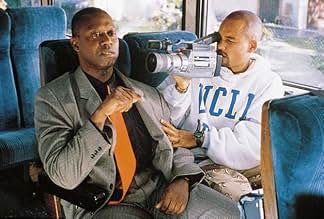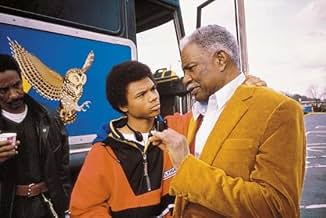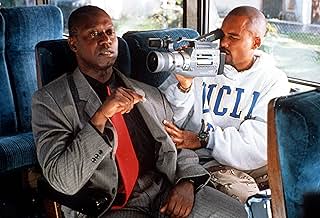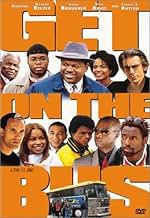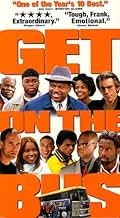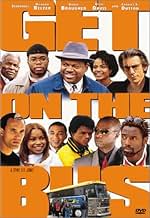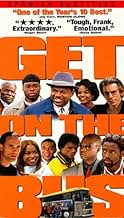PUNTUACIÓN EN IMDb
6,9/10
6,3 mil
TU PUNTUACIÓN
Añade un argumento en tu idiomaA disparate group of African-American men travel by bus to Washington, DC for the Million Man March.A disparate group of African-American men travel by bus to Washington, DC for the Million Man March.A disparate group of African-American men travel by bus to Washington, DC for the Million Man March.
- Dirección
- Guión
- Reparto principal
- Premios
- 2 premios y 5 nominaciones en total
Kristen Wilson
- Shelly
- (as Kristin Wilson)
Reseñas destacadas
Get On The Bus is probably one greatest movies people do NOT know about. This movie places men of all ages and different backgrounds together headed to The Million Man March. Although many may not relate to Farrakhan and his beliefs, they will, however, be educated on issues of race, unity, and respect. Regardless of skin color or ethnic background, people can easily relate to the characters on-screen. If anything, Get On The Bus will teach anyone to have a deeper love and appreciation of our fellow man.
Like most of Spike Lee's films, "Get on the bus" is first and foremost a refreshing alternative to the wave of black-on-black violence cinema started by "Boyz n the hood". While racial issues are present and highlighted, the focus is still human interaction and man's flocking nature. Spike Lee knows how to add depth to his characters, and as the film evolves, the lives and pasts of the central characters unravel piece by piece. Yet, as the many differences are revealed, so are the similarities, and ultimately, the need for companionship in the fight against racism is stronger than any prejudice. Other issues, like reverse racism and homophobia are added as extra spice, preventing the film from ever becoming boring. "Get on the bus" is a warm feel-good movie from the man who convinced me that Harlem would be a nice place to live.
Armed with 16mm cameras, a miniscule budget financed independently by 15 different black businessmen, and a wonderful script, Spike shot "Get On The Bus" and released it to commemorate the one-year anniversary of the 1995 Million Man March. Set on a bus bound for Washington D.C., this film examines the problems and opinions of various of black men on racial issues in the 90's.
Family, misogyny, homosexuality, religion, violence, education, and economics are all addressed here as well as other issues. Spike does not only shed light on issues that pertain to black peoples involvement in White America, but the film also attacks color-consciousness among light-skinned and dark-skinned blacks (as he did in "School Daze"). Like "School Daze," this may be the only other Spike Lee film that seems to be aimed directly at Black America, and Spike shows the varying degrees of complexity with his cast of characters. There is a rage-filled actor, a homosexual couple in the midst of separating (one out-and-proud, the other closeted), a sensitive cop, a level-headed family man, a gangbanger turned Sunni Muslim, a naive filmmaker, and a tired, defeated elderly man. There is also an estranged father who sees the March as an opportunity to re-connect with his resentful, bound-for-crime teenage son. His son has been recently convicted of burglary and has been ordered to remain "chained" to his father for 48 hours, the irony of which does not escape the other members on the bus.
Given the film is almost set entirely on a bus, Spike restrains himself in dispensing out his evolving camera and editing styles, using only a brief sequence set in a desert to bleach the screen with a heavy yellow tint. Many Spike Lee regulars are in the film, like Ossie Davis and Isaiah Washington who give sound performances (Davis' "I lost everything" monologue is especially moving). The real notable acting is provided by Andre Braugher as an angry, egocentric actor whose rage is fortunately balanced for him with a healthy dose of articulated intelligence and Roger Guenever Smith as a sensitive, bi-racial cop who works in South Central Los Angeles. Those two really are the stand-outs in this film.
The dialogue is so flowing and casual in this film despite its topic matter, that you could listen to this film instead of watch it! I can't recommend this film enough for fans of Spike Lee or fans of great dialogue. As a Spike Lee worshipper, I rank this film in his top 5. Potent.
Family, misogyny, homosexuality, religion, violence, education, and economics are all addressed here as well as other issues. Spike does not only shed light on issues that pertain to black peoples involvement in White America, but the film also attacks color-consciousness among light-skinned and dark-skinned blacks (as he did in "School Daze"). Like "School Daze," this may be the only other Spike Lee film that seems to be aimed directly at Black America, and Spike shows the varying degrees of complexity with his cast of characters. There is a rage-filled actor, a homosexual couple in the midst of separating (one out-and-proud, the other closeted), a sensitive cop, a level-headed family man, a gangbanger turned Sunni Muslim, a naive filmmaker, and a tired, defeated elderly man. There is also an estranged father who sees the March as an opportunity to re-connect with his resentful, bound-for-crime teenage son. His son has been recently convicted of burglary and has been ordered to remain "chained" to his father for 48 hours, the irony of which does not escape the other members on the bus.
Given the film is almost set entirely on a bus, Spike restrains himself in dispensing out his evolving camera and editing styles, using only a brief sequence set in a desert to bleach the screen with a heavy yellow tint. Many Spike Lee regulars are in the film, like Ossie Davis and Isaiah Washington who give sound performances (Davis' "I lost everything" monologue is especially moving). The real notable acting is provided by Andre Braugher as an angry, egocentric actor whose rage is fortunately balanced for him with a healthy dose of articulated intelligence and Roger Guenever Smith as a sensitive, bi-racial cop who works in South Central Los Angeles. Those two really are the stand-outs in this film.
The dialogue is so flowing and casual in this film despite its topic matter, that you could listen to this film instead of watch it! I can't recommend this film enough for fans of Spike Lee or fans of great dialogue. As a Spike Lee worshipper, I rank this film in his top 5. Potent.
Let me begin by letting you know I am neither black or white. I say this so you don't think I speak from a particular bias. I firmly believe that Spike Lee captured the central epic struggle within the black community and its overall effect on the American landscape as a whole. I was happy to see that ALL aspects of the society were equally represented in this film without reinforcing dated stereotypes. This is clearly Lee's greatest work.
EVERYONE SHOULD SEE THIS MOVIE ONCE.
EVERYONE SHOULD SEE THIS MOVIE ONCE.
Get on The Bus is all about dialogue. That is, a dialogue between one community of Americans, within the confines of a bus headed to the 1995 Million Man March. This is an emotional rollercoaster. None of the men in this film are of the same mindset, or from the same walk of life, but have come together for a common cause. Ossie Davis gives an all-time great performance. Overall, this is an under-appreciated Spike Lee joint. Perhaps it will find a new life in the times we are living in.
¿Sabías que...?
- CuriosidadesRather than seek studio financing, Spike Lee financed the film with monetary contributions from famous black men so as to reflect the spirit of the Million Man March. The contributors included (but were not limited to): Will Smith, Danny Glover, Wesley Snipes, Johnnie L. Cochran Jr., and Robert Guillaume.
- PifiasWhile driving from South Los Angeles to Washington DC, the bus takes the Pasadena Freeway north from downtown LA. This freeway ends in Pasadena and is not the way one would travel across the country. Furthermore, a bus of this size would not be permitted on this freeway.
- Créditos adicionalesRecumbent riders: Carol and Ken Lyon, who just happened to ride through the set on their Cross-Country Ramble from Ventura, CA, to Galveston, TX.
- Banda sonoraOn The Line
Written by Kenneth 'Babyface' Edmonds (as Babayface)
Used by Permission of Sony/ATV Songs LLC and ECAF Music (BMI)
Produced by Babyface for ECAF Productions, Inc.
Performed by The King of Pop, Michael Jackson
Courtesy of EPIC Records
Selecciones populares
Inicia sesión para calificar y añadir a tu lista para recibir recomendaciones personalizadas
- How long is Get on the Bus?Con tecnología de Alexa
Detalles
Taquilla
- Presupuesto
- 2.400.000 US$ (estimación)
- Recaudación en Estados Unidos y Canadá
- 5.754.249 US$
- Fin de semana de estreno en EE. UU. y Canadá
- 2.156.409 US$
- 20 oct 1996
- Recaudación en todo el mundo
- 5.754.249 US$
- Duración
- 2h(120 min)
- Color
- Mezcla de sonido
- Relación de aspecto
- 1.85 : 1
Contribuir a esta página
Sugerir un cambio o añadir el contenido que falta


